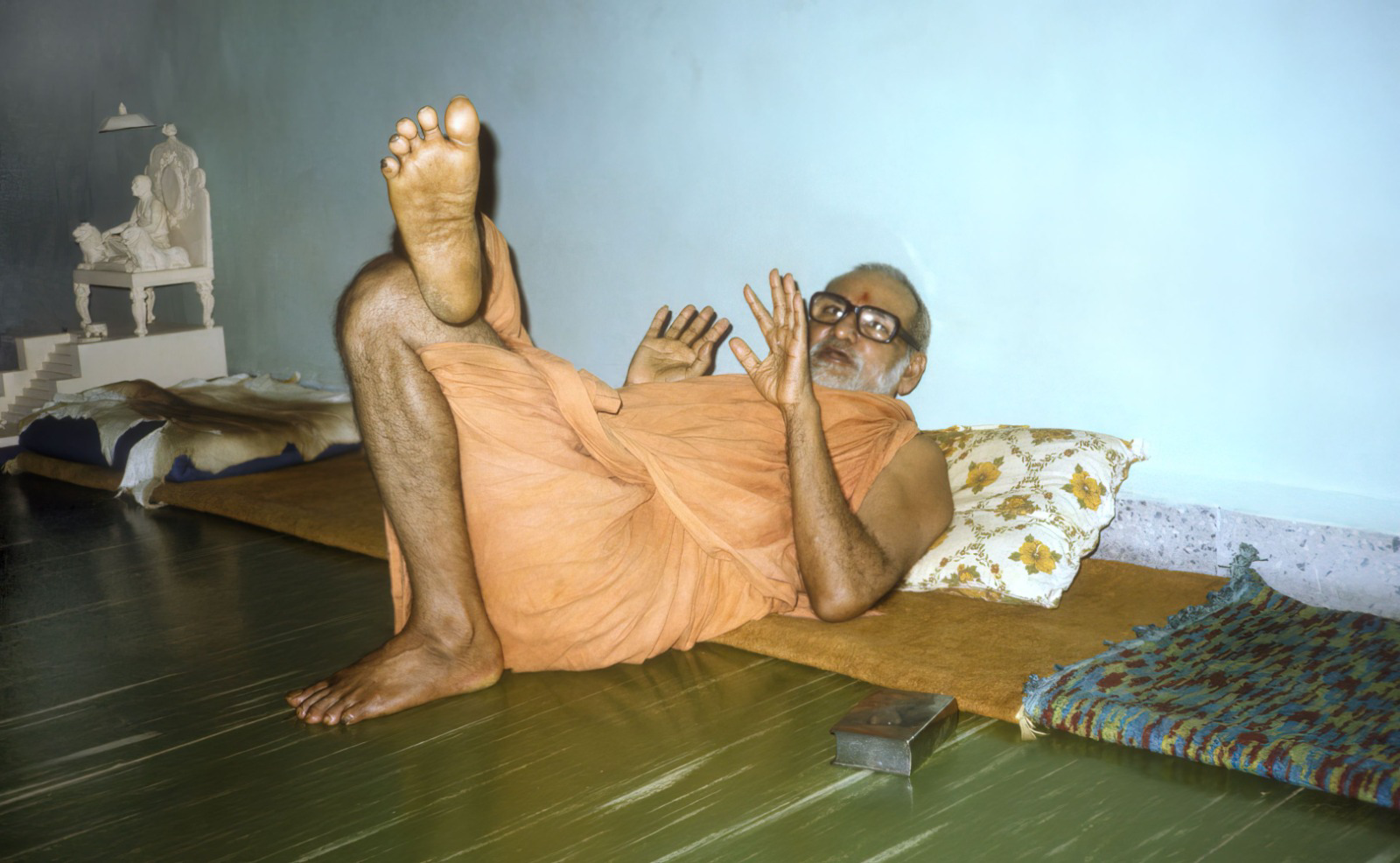‘A human being can acquire God-like qualities and uplift humanity.’
So what of Man? In the same way that a cloth consists of many individual strands to which it owes its strength, we also consist of many lives. We think of ourselves as one life but actually this body consists of many organisms.
This body is a world, a universe just like the one outside and that is why Satpurushas all say to look there, inside. If you look outside of yourself, you won't find anything.
In this body are seven seas, such as ghee (fat) a red sea (blood), a salt sea (urine), a sea of acid (stomach), and so on. [Babaji points to his head.] This is a hill with forest growing (hair). If not maintained carefully, all kinds of creatures will make their homes there. There are mountain ranges [points to two arms and two legs]. Between them in the valley is jungle with flowing rivers. Different animals and birds come and inhabit this world of the body and try to cultivate fields (ringworm, etc.) and establish territories (the various diseases). A mosquito tells its children 'I'll bring you food' and then goes to drill for blood on this world. I, as the owner or God, protect my territory by killing the mosquito. Similarly, by use of medicines I attempt to wipe out the alien organisms causing me disease.
Let us suppose a great swami or mahatma dies unattended somewhere. Within three days a terrible smell will emanate from his body and there will be a danger of infection from cholera. A doctor might have to be called in to inoculate any local residents and a dog eating his flesh might even suffer madness. Certainly the great Mahatma’s body will have to be buried or burnt immediately. And yet, in the scriptures it is said that to be given the body of a human being is the choicest of births.
What then is so special about a human being? It is man who has access to three higher faculties that separate him from the animal kingdom. Jnan (knowledge), Vijnan (higher spiritual knowledge). and finally, the experience of Anand (supreme bliss). These faculties grant him the unique capacity to realize that his source is God and the ability to return to Him. But what is it that has its eternal source in God? Certainly not the body.
The scriptures talk of the angustha purusha (thumb-sized person) which dwells in the heart. Within it are contained all the stored desires and deeds of the individual soul. This angustha purusha uses the body and manifests through it. When its play in a particular body is finished, the body is discarded and the soul finds a new vehicle through which to manifest. Some people say there is no reincarnation but it is a fact nevertheless that we take birth according to our deeds. Whatever role destiny has given us to perform, we will have to play out to the end.
As we can see in the following story, happiness lies in accepting our particular destiny as part of God's leela or divine play.
Everything's for the Best
A certain king one day had an accident in which his toe had to be amputated. Seeing the misfortune, his favorite minister remarked in the presence of the suffering king, 'Very good, everything's for the best’. On hearing this, the king became furious and dismissed him on the spot from his position as Chief Minister. To the king's astonishment the minister's reply was, “Very well. Everything's for the best.'
Some little time later the king went out hunting in a dense jungle as was his habit and whilst chasing a deer somehow got separated from his companions and became hopelessly lost. Now there lived in that jungle a primitive tribe who habitually offered human sacrifice to their god. A party of them cunningly succeeded in capturing the king. Binding him hand and foot, they took him to their village and threw him in a dark hut. Soon the full moon day came and the villagers were dancing in frenzied anticipation for the moment when their victim was to be sacrificed.
At last the high priest, in a trance and brandishing a big sword, ordered the prisoner to be brought out; the king was garlanded and brought in front of the deity. Suddenly the priest stiffened. 'Why did you bring him? He is incomplete. He has already been cut,' he shouted disgustedly, pointing to the king's severed toe. 'Get him out of here.'
So, a couple of days later, the chastened king limped back to his capital. Despite his condition, he summoned his former minister and told his story.
“Beloved friend, my amputated toe has saved my life. You were absolutely correct in saying "very good" and I request you humbly to accept back your former position as my Chief Minister. But tell me, why did you also say about your dismissal, “Very well, everything's for the best.”
'Your Majesty,' replied the minister, ‘everything happens for the best. Look at it this way. If you hadn't dismissed me, I would most certainly, as your Chief Minister, have been caught along with you by those tribesmen. Whereas they rejected you as a sacrifice, it is doubtful they would have rejected me!'
In fact, it is our destiny that we come into the world to act like actors in a drama. Actually, I'm not a Swami and he [Babaji points to a visitor] is not a doctor. It's the atma which assumes these various roles for its own satisfaction and sport.
In a man not only are the five elements present, but additional faculties necessary for the soul's play in the body. These are manas, buddhi, and ahamkara. Together they constitute what we commonly call mind or antahkarana (the inner psychic instrument). They are, in effect, the eyes of the soul.
